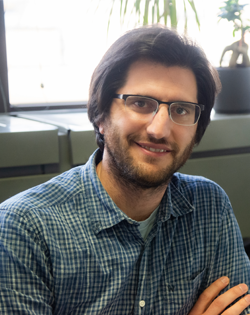Vector Integration Core
Mario Squadrito

Email: squadrito.mario@hsr.it
Location:
SR-Tiget Group Leader, Vector engineering and in vivo tumor targeting
Mario Leonardo Squadrito is Group Leader at the San Raffaele Telethon Institute for Gene Therapy (SR-Tiget). He earned his PhD from San Raffaele University in Milan and the Open University in the UK, where he applied gene transfer technologies and RNA sequencing analysis to identify and characterize a previously unknown microRNA, miR-511-3p, and to investigate how the tumor microenvironment promotes tumor growth. He completed his postdoctoral training at the École Polytechnique Fédérale de Lausanne (EPFL), focusing on novel mechanisms of cell-to-cell communication. During this time, he also studied the role of microRNAs in macrophages and developed new chimeric antigen receptors (CARs) to enhance antigen uptake by engineered dendritic cells, contributing to the development of a new class of antigen-agnostic vaccines. At SR-Tiget, his team designs innovative in vivo gene transfer systems that combine selective targeting of immune cells with efficient gene delivery. The group integrates expertise in in vivo gene therapy, tumor mouse models, vector design, and omics technologies to advance therapeutic strategies for cancer and immune-related diseases.
Mario Leonardo Squadrito is the author of over 40 peer-reviewed publications and five patents. His work has been cited more than 5,000 times, reaching an H-index of 27 (according to Google Scholar, as of May 2025). He is regularly invited at leading international gene therapy conferences, including the ASGCT, ESGCT, and SFTCG. He also serves as a reviewer for several high-impact journals, such as Nature Cancer, Nature Communications, Nucleic Acids Research, Science Translational Medicine, and Molecular Therapy, among others. He has received several competitive grants and awards, including the AIRC Investigator Grant, the FIS Starting Grant (ranked first nationally), the FRRB Young Investigator Award, and a Giovani Ricercatori grant from Fondazione Cariplo. His research has also been recognized with the Lorini Award for best cancer publication (Kerzel et al., Cancer Cell 2023) and the Giovanna Tosi Award for tumor immunology (Squadrito et al., Nature Methods 2018).
